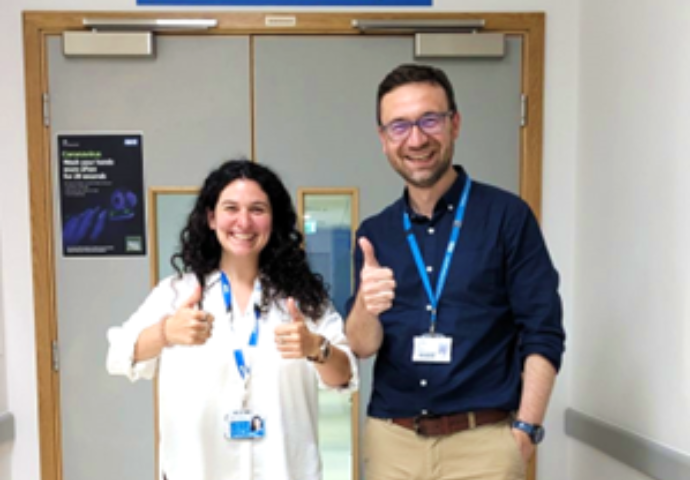Previous research with CPFT suggests that low level inflammation caused by overactivity in areas of the immune system - which can be measured by a blood test, may play a role in the development and persistence of psychotic symptoms in severe mental health conditions. Inflammation may also make it difficult for people to get better with standard antipsychotic medications.
The Psychosis Immune Mechanism Stratified Medicine Study (PIMS) will assess if reducing inflammation with an anti-inflammatory drug called tocilizumab can help manage psychotic symptoms and improve memory function in people with psychosis.
Consultant psychiatrist Dr Muzaffer Kaser is the co-Principal Investigator for the Cambridge site, pictured with research assistant Laura Alvarez-Sanchez. Muzaffer said: “We are working closely with CPFT’s mental health services to offer this experimental study to suitable people with psychosis. We recently had the landmark moment of our first participant completing the infusion of tocilizumab/placebo at the Cambridge Clinical Research Facility on the Cambridge Biomedical Campus. We hope that this new treatment approach may open up more effective routes to recovery from psychosis and improved quality of life for many people in future.”
The study team is looking for people experiencing psychosis in their first three years of contact with mental health teams, particularly early intervention services. The study involves a screening visit and blood tests for suitability followed by shorter follow-up visits and the placebo/tocilizumab infusion sessions for those who show test results of elevated inflammation. The participants are also asked to complete cognitive tests and an MRI as part of the study. If you would like to take part or have any queries about the PIMS study, contact CPFT’s clinical research delivery team at: wru@cpft.nhs.uk.
Co-lead Dr Graham Murray, CPFT consultant psychiatrist and Professor of Psychiatry and Neuroscience at the University of Cambridge Department of Psychiatry said: “I’m delighted that our CAMEO early intervention service is offering this study to local people and working together with the Universities of Cambridge, Bristol and Birmingham on this innovative research project investigating new ways of treating psychosis.”
CPFT’s Research and Development Director Dr Ben Underwood said: “We endeavour to offer groundbreaking clinical trials and experimental studies to all our patients at CPFT, so they have a chance to benefit from the latest therapeutic approaches. This is an exciting study exploring a crucial relationship between inflammation, which is increasingly linked to many mental health conditions, and how this could influence recovery from one of the most severe mental illnesses.”
This research is funded by the Medical Research Council and run in collaboration between the Universities of Birmingham, Bristol and Cambridge supported by the National Institute for Health and Care Research (NIHR) Cambridge Clinical Research Facility, Cambridge University Hospitals and Cambridgeshire and Peterborough NHS Foundation Trusts.
Read more about this national study: https://www.birmingham.ac.uk/research/mental-health/psychosis-immune-mechanism-stratified-medicine-study
Image: Consultant psychiatrist Dr Muzaffer Kaser is the co-Principal Investigator for the Cambridge site, pictured with research assistant Laura Alvarez-Sanchez. Muzaffer.



